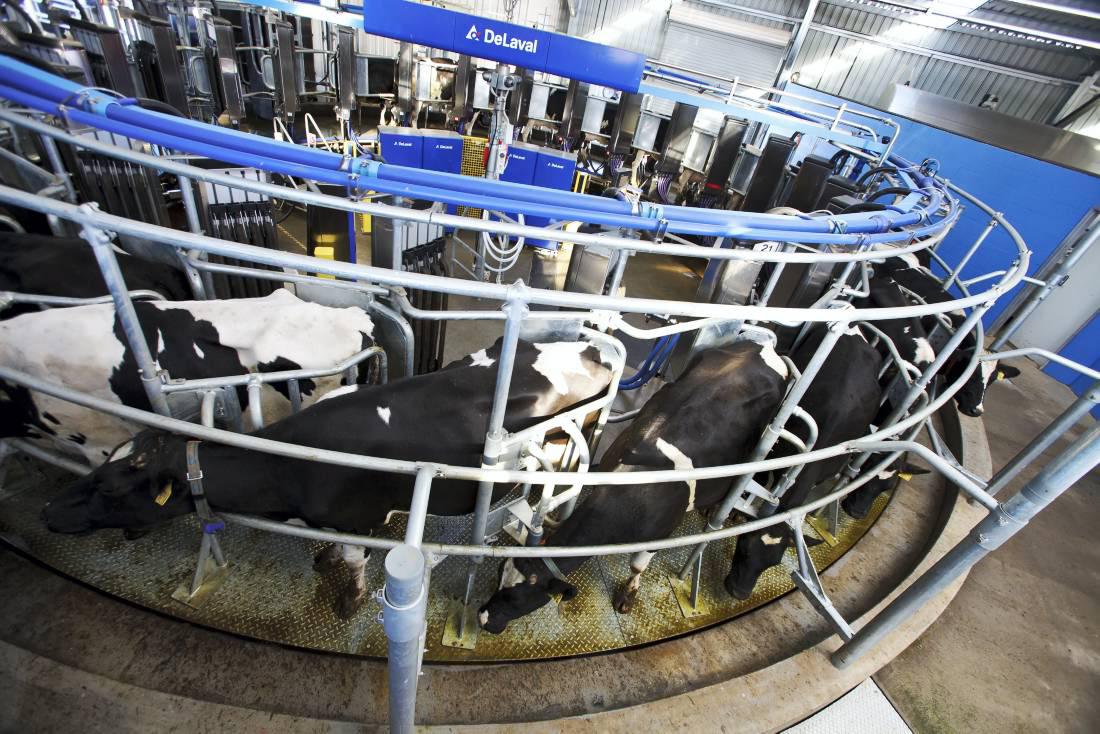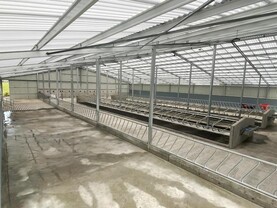Rotary robot for Finland
Just before Christmas Finland’s largest dairy farm Finnmilk opened its doors to the public using DeLaval’s AMR™ (automated milking rotary).
A robotic rotary has long been the holy grail for manufacturers. DeLaval has a few installed on a number of farms around the world and now Finland has one.
Finnmilk was established in 2013. The shareholders are Ari Teppo, Katja and Juhani Korkiamäki, and Petter Sandelin. They have experience with robotic milking since 2003 when they installed several DeLaval milking robots. Milk yield per cow is high with an average of over 10,000 kg.
DeLaval said: “We wanted to take a key step forward in keeping labour costs low even for a herd size larger than 300. We explored different options and the alternative was a 50-bail parallel rotary.”
As we have reported previously in these pages, Finnish milk production is declining year-on-year despite exceptionally high milk prices because of the large cost of inputs in this cold part of the world.
Robert Jensen of DeLaval said: “We are very pleased that Finnmilk is now up and running. During the last few months, we have noticed an increased interest for our robot rotary in particular from Germany, Scandinavia, and Southern Europe but also from countries like Japan and Australia.”
Nobody from DeLaval was available this week to discuss price and commercial availability in Ireland.
Overview of products provided:
Two animal halls.Cow hall 1, 126x36m, four parts for 480 cows.Cow hall 2, 117x38m. Milking plus waiting area, special area for high-yielding and dry cows (120 places), calving area, treatment area.Calf hall for 90 calves.Planned silos for silage, 12,000m³.Manure bunkers. Robot rotary installations carried out by De Laval, start date for milking and number of cows milked on farm:
Laproma, March 2013 – 740.Kamsdorf, September 2014 – 600.Buttelstadt, June 2015 – 370.Finnmilk, January 2015 – 600.Odensviholm, November 2009 – 450 Hörninge (installation in progress) – 360Lövsta, September 2011 – 180 Ottenby, January 2013 (test installation) – 400. Sydney University, August 2014 – 400. Gala farm, October 2011 – 570. Dairymaster recruitment drive
in bid to meet export demand
As you will have seen in the Irish Farmers Journal last week, Dairymaster is looking for new staff to meet demand from a large export market. Almost 75% of product made in Dairymaster HQ in Causeway is exported.
Dairymaster said: “We are looking for everything from software developers to design engineers and installation & service technicians to social media experts. We are deliberately choosing Christmas to recruit people so that we can offer people who may be looking for a new exciting career or who may have left Ireland the opportunity to come back to work with a forward-thinking manufacturing company dedicated to success.”
Dairymaster is looking to hire C# software developers, embedded software engineers, electronics design engineers, mobile app developers, vision and robotics software engineers, user interface developers, product support engineers (with German), design engineers, CNC machine operators, laser cutting operatives, TIG/MIG welders, purchasing specialists, installation and service technicians, truck drivers, marketing executives, web developers and marketing technologists, internationals sales executives with Spanish and Chinese, PCB/electrical specialists and product specialists.
Partners make switch to gas for dairy water heating
The farm partnership of Andrew Purcell of Kiltallaght farm and Alf McGlew of Rinkinstown farm near Termonfeckin in Co Louth has switched from electricity to LPG for its dairy water heating operations.
Up to now the partners have been milking 300 cows in a 20-unit parlour but the plan is to milk 35 units, hence increasing need for warm water.
The partners approached Flogas to see if the company could offer a more tailored solution for their business. Tom Wall, Flogas sales executive, visited the farm with a local approved LPG installer to undertake a free site survey and present a proposal to them.
Two 56kw FASTflo water heaters would be installed on to either an internal or external wall (no additional weather protection required) and then piped to a Flogas LPG tank placed on-site. The new heating system would provide on-demand hot water at whatever temperature was required, determined by an easy to use temperature controller that allowed the water to be heated from anywhere between 37°C and 80°C. When it is switched on, the water heater is designed to heat up to 80°C, effectively killing any bacteria. As one heater produces 140 litres of hot water in 10 minutes, using two would mean 280 litres of hot water in the same time period.
Wall said: “Basically, the system is tailor made for the needs of a dairy farm and the excellent feedback we’ve been getting from those who’ve made the switch is bearing this out. The primary benefit is, of course, the instant hot water on demand but now all the farm’s needs are being met for the equivalent cost of the night rate electricity rather than the more expensive daily rate.”
Rotary robot for Finland
Just before Christmas Finland’s largest dairy farm Finnmilk opened its doors to the public using DeLaval’s AMR™ (automated milking rotary).
A robotic rotary has long been the holy grail for manufacturers. DeLaval has a few installed on a number of farms around the world and now Finland has one.
Finnmilk was established in 2013. The shareholders are Ari Teppo, Katja and Juhani Korkiamäki, and Petter Sandelin. They have experience with robotic milking since 2003 when they installed several DeLaval milking robots. Milk yield per cow is high with an average of over 10,000 kg.
DeLaval said: “We wanted to take a key step forward in keeping labour costs low even for a herd size larger than 300. We explored different options and the alternative was a 50-bail parallel rotary.”
As we have reported previously in these pages, Finnish milk production is declining year-on-year despite exceptionally high milk prices because of the large cost of inputs in this cold part of the world.
Robert Jensen of DeLaval said: “We are very pleased that Finnmilk is now up and running. During the last few months, we have noticed an increased interest for our robot rotary in particular from Germany, Scandinavia, and Southern Europe but also from countries like Japan and Australia.”
Nobody from DeLaval was available this week to discuss price and commercial availability in Ireland.
Overview of products provided:
Two animal halls.Cow hall 1, 126x36m, four parts for 480 cows.Cow hall 2, 117x38m. Milking plus waiting area, special area for high-yielding and dry cows (120 places), calving area, treatment area.Calf hall for 90 calves.Planned silos for silage, 12,000m³.Manure bunkers. Robot rotary installations carried out by De Laval, start date for milking and number of cows milked on farm:
Laproma, March 2013 – 740.Kamsdorf, September 2014 – 600.Buttelstadt, June 2015 – 370.Finnmilk, January 2015 – 600.Odensviholm, November 2009 – 450 Hörninge (installation in progress) – 360Lövsta, September 2011 – 180 Ottenby, January 2013 (test installation) – 400. Sydney University, August 2014 – 400. Gala farm, October 2011 – 570. Dairymaster recruitment drive
in bid to meet export demand
As you will have seen in the Irish Farmers Journal last week, Dairymaster is looking for new staff to meet demand from a large export market. Almost 75% of product made in Dairymaster HQ in Causeway is exported.
Dairymaster said: “We are looking for everything from software developers to design engineers and installation & service technicians to social media experts. We are deliberately choosing Christmas to recruit people so that we can offer people who may be looking for a new exciting career or who may have left Ireland the opportunity to come back to work with a forward-thinking manufacturing company dedicated to success.”
Dairymaster is looking to hire C# software developers, embedded software engineers, electronics design engineers, mobile app developers, vision and robotics software engineers, user interface developers, product support engineers (with German), design engineers, CNC machine operators, laser cutting operatives, TIG/MIG welders, purchasing specialists, installation and service technicians, truck drivers, marketing executives, web developers and marketing technologists, internationals sales executives with Spanish and Chinese, PCB/electrical specialists and product specialists.
Partners make switch to gas for dairy water heating
The farm partnership of Andrew Purcell of Kiltallaght farm and Alf McGlew of Rinkinstown farm near Termonfeckin in Co Louth has switched from electricity to LPG for its dairy water heating operations.
Up to now the partners have been milking 300 cows in a 20-unit parlour but the plan is to milk 35 units, hence increasing need for warm water.
The partners approached Flogas to see if the company could offer a more tailored solution for their business. Tom Wall, Flogas sales executive, visited the farm with a local approved LPG installer to undertake a free site survey and present a proposal to them.
Two 56kw FASTflo water heaters would be installed on to either an internal or external wall (no additional weather protection required) and then piped to a Flogas LPG tank placed on-site. The new heating system would provide on-demand hot water at whatever temperature was required, determined by an easy to use temperature controller that allowed the water to be heated from anywhere between 37°C and 80°C. When it is switched on, the water heater is designed to heat up to 80°C, effectively killing any bacteria. As one heater produces 140 litres of hot water in 10 minutes, using two would mean 280 litres of hot water in the same time period.
Wall said: “Basically, the system is tailor made for the needs of a dairy farm and the excellent feedback we’ve been getting from those who’ve made the switch is bearing this out. The primary benefit is, of course, the instant hot water on demand but now all the farm’s needs are being met for the equivalent cost of the night rate electricity rather than the more expensive daily rate.”






 This is a subscriber-only article
This is a subscriber-only article










SHARING OPTIONS: